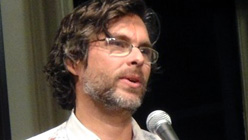Michael Chabon, Berkeley-based author of the Pulitzer Prize-winning “The Amazing Adventures of Kavalier and Clay,” joins us in the studio. Set in the East Bay, Chabon’s new novel “Telegraph Avenue” deals with issues of race relations and gentrification, and explores the worlds of midwifery and vintage vinyl.
Interview Highlights
On Being a White Man Writing Black Characters
"I was acutely self-concious while writing this book and handling black characters. I did my upmost to be completely concsicous of the pitfalls that were inherent in that task and to not only be concsicous of them but to acknowledge them not only to myself but in the text itself. Even with the use of blaxploitnation, which is partly about how cool it is, how visually and especially musically, how amazing that material is, it's also a way of signally to the reader, "I know this is a fraught thing, that blaxplotiation was a dubious, ambigious thing and what I am doing partakes in part of that ambiguity."
On Not Seeing Himself as a Political Writer
"I don't see myself as a political writer. My politics don't consciously and deliberately enter into the subjects I choose to write about. I don?t come at my writing from a political angle, at least in any conscious way. I mean, I'm aware there are all kinds of invisible political elements that go into the things I choose to write about. The motivation for me is to play with language and tell stories. That's it. And to hopefully snare the reader and hold onto the reader for as long as the book lasts. And hopefully, again, leave the reader feeling sorry that the book ended."
On the Binding of Isaac as a Recurring Theme in His Writing
"I think a central story for me, you know, we all have certain myths or stories or archetypes that we keep circling back on that never lose their power to fascinate and seem to explain the world around us, and absolutely one of those stories for me is story of the sacrifice of Isaac, of Abraham and Isaac. The 'Binding of Isaac,' as it's called. No matter how many times I read that, no many how many times I think about it, I can never quite get to the bottom of it and it seems to hold so many possibilities. Why would God ask for it? Why would Isaac do it?…There are so many layers of reciprocity, of love and violence, that seem to be bound up in that story, the binding of Isaac. That has always resonated with me and I think you see it not just in a pervasive them in this book but in Yiddish Police Men, where I think it's explicitly referred to. You know almost everything I've ever written plays some kind of variation on that theme."
On the Difficulty of Writing Villainous Characters
"I'm very bad at creating villains. Because every time I set out to try to create just an out and out thoroughly despicable character, I falter. I can't pull the trigger. So in the case of The Amazing Adventures of Kavalier and Clay, there's this character named George Deasey in that book, who's an editor, a comic book character. And I modeled him, very loosely, on actually two separate famously horrible, beastly characters of the Golden Age and Silver Age of comics, both of them were supposed to be just total jerks. I was like 'I gotta have a jerk editor in my book cause there's precedent for that.' And in the end, I just couldn't do it. I got too interested in George Deasey and he ends up passing on some life changing advice to one of the main characters in that book."
"I have also almost rehabilitating ability to see the other side of things, to play devil's advocate, or look at something from the opposing point of view. It often frequently weakens my resolve, it weakens my position. Certainly in a political context I have to keep reminding myself, you know, that there's a limit to how much credit you need to give the other side who are trying to do things that are destructive. But in the case of my fictions I don't have that sense that it's so much of a weakness."
- More: About the book “Telegraph Avenue” – at IndieBound.org
- More: About Michael Chabon – at MichaelChabon.com
- More: Berkeley bookstore becomes “Brokeland Records”
